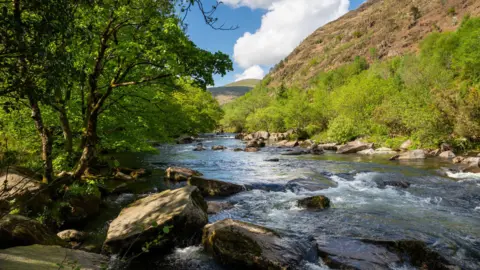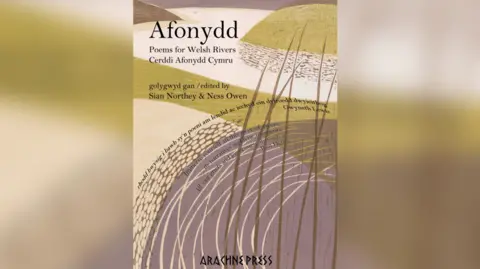Bilingual poetry book encourages writing in Welsh
 Getty Images
Getty ImagesA new bilingual collection of poems celebrating Wales' rivers gives Welsh and English "equal weight" to encourage poets to write in their first language.
Fifty poets from Wales each write about specific waterways in rural as well as urban settings which are of particular significance to them in the collection named Afonydd, Welsh for rivers.
Some poems examine childhood memories, pollution or climate change, while in others the river is symbolic for the Welsh language, representing change.
Every poem is translated either from Welsh to English, or English to Welsh, Publisher Arachne Press said.
The publisher said it had been inspired by the success of its best-selling bilingual collection of poems: A470: Poems for the Road /Cerddi'r Ffordd.
The collection featured poems focusing on the impact of Wales' main artery from north to south, with poets reflecting on memories of the journeys they made along the road or its impact on the landscape.
"We were very aware that although great fun as a theme, a book about a road wasn't the most eco message we could send out," Arachne Press director Cherry Potts said.
"The advantage rivers had as a theme, is that in Wales in particular it is really inclusive, and poets could write about almost anything in connection to a river."
 Arachne Press
Arachne PressFor Afonydd: Poems for Welsh Rivers /Cerddi Afonydd Cymru, the publisher chose 50 poems from over 400 entries in response to an open call.
Each poem is published side by side with its translation either from, or into, Welsh, and the language the poem arrived in dictates which goes on the left page.
"We wanted to give Welsh equal weight. There is an ingrained assumption that to reach a big audience, poetry from Welsh poets must be in English," Ms Potts said.
"Because we wanted to encourage this group of poets to explore their first language, their mamiaith, we adopted the approach that whichever language the poem arrived in, we would translate, or help the poet translate."
Poet Natasha Gauthier, whose poem The Severn at Llanidloes is featured in Afonydd, said she was intrigued by the idea that the river Severn, "transforms from a Welsh river into an English one, 'bends the knee' and gradually loses its Welshness, its identity".
 Gareth Writer-Davies
Gareth Writer-DaviesThe Québecoise Canadian writer living in Cardiff grew up in Montreal, "in a culture that has fought for its language and identity and is proud of that fight", she said.
"So the idea of how Welsh survives against a 'rising tide' of English is a familiar concept to me," she said.
She is learning Welsh and while she submitted her poem in English, she said she loved the Welsh translation.
"The poet Christopher Meredith mentioned to me that 'hallt' (for 'salty English') in Welsh can also mean something that stings, that costs you dearly - his Welsh-speaking mother would use it to describe something expensive," she said.
"So I very much like that double meaning."
Lesley James, whose poem Afon Lash Cleanliness Is Next to Godliness is also featured in the book, said a river can be an indicator of the social, economic and environmental health of a village.
She said she has fond memories of the River Lash, close to where she grew up in west Wales, but that she was "astonished" to recently find out it was among the most heavily polluted rivers in the United Kingdom.
Ms James also said the "amalgamation" of English and Welsh in the book "can only have a positive effect" on efforts to promote Welsh language.
"It is how most of us speak when we come from that part of the world," she said.
